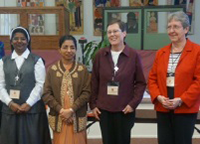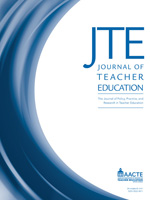07 Aug2014
By Tiffany S. Erickson
The views expressed in this post do not necessarily reflect the views of AACTE.
 Last month, the Council for the Accreditation of Educator Preparation (CAEP) announced Angela Duckworth as the first keynote speaker for the 2014 Fall CAEP Conference in Washington, DC. We are equally excited to announce that civil rights scholar Christopher Edley will keynote on Day 2 of the conference.
Last month, the Council for the Accreditation of Educator Preparation (CAEP) announced Angela Duckworth as the first keynote speaker for the 2014 Fall CAEP Conference in Washington, DC. We are equally excited to announce that civil rights scholar Christopher Edley will keynote on Day 2 of the conference.
Edley, former dean of the University of California-Berkeley School of Law, is currently faculty director of the Chief Justice Earl Warren Institute on Law and Social Policy, which he cofounded. He also was cofounder of the Civil Rights Project at Harvard University, where he taught law for 23 years.
07 Jul2014
By Tiffany S. Erickson
The views expressed in this post do not necessarily reflect the views of AACTE.
The University of Pennsylvania’s Angela Duckworth, whose top-rated Ted Talk on “grit” has received more than 4.6 million views, will be the keynote speaker at the 2014 Fall CAEP Conference (CAEPCon) Tuesday, September 30. The conference is being held in partnership with AACTE.
Duckworth’s research on non-IQ competencies that predict achievement influenced the development of CAEP Standard 3: Recruitment and Selectivity. The topic of Duckworth’s keynote will be “True Grit.”
17 Jun2014
By Kristin McCabe
This summer, two national education organizations will revise the model standards for the preparation, performance, support, and evaluation of school leaders. The work is expected to be completed in October.
With renewed support from the Wallace Foundation, the Council of Chief State School Officers (CCSSO) and the National Policy Board for Education Administration (NPBEA) will convene panels to update the Interstate School Leaders Licensure Consortium (ISLLC) standards, last updated in 2008, and the National Educational Leadership Preparation (NELP) standards, last revised in 2011. The effort also includes drafting new standards for superintendents or other central-office staff who supervise principals.
15 May2014
By Kristin McCabe

Alverno’s Mary Diez (right) with her SSSF vice presidents
It’s hard to believe, but it’s true: After 38 years, Mary Diez is leaving Alverno July 1.
Diez, professor and former dean of the School of Education at Alverno College (WI), was elected last month to a 4-year term as president of the School Sisters of St. Francis (SSSF), an international congregation with 850 sisters in the United States, Europe, India, and Latin America. This full-time commitment will take her to all of those places, although she plans to retain her campus residence at the college where she has lived for nearly 4 decades.
Taking her leadership skills off campus is hardly new for Diez, whether as a consultant in the Milwaukee community, member of standards boards, convener of assessment institutes, champion of dispositions work, or president of AACTE—among countless other roles she has held around the country and internationally. Despite having so much on her plate, Diez generously responded to my questions this week about her career to date and future plans.
06 May2014
By Kristin McCabe
Want to make sure the Council for the Accreditation of Educator Preparation (CAEP) hears from the field? A new survey asks teacher educators to help shape CAEP’s advanced standards, weigh in on preferred accreditation supports, and more.
In an announcement posted yesterday, CAEP invites institutions to provide feedback via an online survey. Part of the instrument is described as “a critical research project to ensure the highest level of service and support to institutions,” while other questions seek input on newly drafted standards for preparation programs at the advanced level. Participation in the survey is anonymous.
You have only a brief window to respond, so don’t delay: The survey is open through Thursday, May 15.
23 Apr2014
By Elizabeth Ross
Last week, I participated in a summit at Lock Haven University in Pennsylvania on implementing and preparing for the Pennsylvania Core Standards. In attendance were the institution’s president and vice provost along with faculty, deans, and other administrators from throughout the university. Administrators and teachers from nearby PK-12 school districts as well as representatives from the Pennsylvania Department of Education also joined us.
Following my keynote presentation discussing the fundamental instructional shifts of the Pennsylvania Core, all vested stakeholder groups took part in a conversations addressing the impact of the standards on their programs and the supplemental changes necessary to enact to support implementation. Among the suggested changes were strengthening ties with the PK-12 districts to provide necessary clinical experiences for candidates and deepening core content knowledge of both in-service and preservice teachers. One great idea was for the university to host academies throughout the summer to provide training for PK-12 teachers and administrators.
08 Apr2014
By Kristin McCabe
Policy makers should allow more time for schools to implement the Common Core State Standards (CCSS), according to a statement released today by the Learning First Alliance.
The Alliance—a partnership of leading education organizations, including AACTE—wants policy makers to make sure instructional alignment and various supports are established before they apply high-stakes consequences to CCSS test results.
In support of this agenda, a new web site houses implementation success stories, such as podcasts from selected states, and a collection of other implementation resources.
01 Apr2014
By Elizabeth Ross
Starting last week, approximately 4 million students across 36 states and the District of Columbia began taking field tests for the Common Core State Standards (CCSS) assessments developed by the PARCC and Smarter Balanced consortia. The field tests are scheduled to run March 24 through June 6.
A few states are piloting the tests on a broader scale. Nearly all students in California, Connecticut, Idaho, Montana, and South Dakota will participate in the field tests.
26 Feb2014
By Sharon Robinson
When Mary Brabeck, dean of the Steinhardt School of Culture, Education, and Human Development at New York University, agreed to grant me a recorded in-person interview (see link below) regarding her new role as board chair of the Council for the Accreditation of Educator Preparation (CAEP), I was thrilled.
It is fair to say that I have a long-standing relationship with Mary Brabeck. In 2005, Dean Brabeck chaired the Board of AACTE when I was selected to be the president and chief executive officer.
18 Dec2013
By Elizabeth Ross
Earlier this month, I participated in a workshop of the Council for the Accreditation of Educator Preparation’s State Alliance for Clinical Preparation and Partnerships in Louisville, Kentucky. The 11 states in the alliance (Alabama, Colorado, Kansas, Kentucky, Louisiana, Maryland, Missouri, New York, Ohio, Oklahoma, and Oregon) have formed a network to improve the systemic infrastructure supporting high-quality clinical experiences for teacher candidates. Mark LaCelle-Peterson, senior vice president for Engagement, Research, and Development at CAEP, framed the discussions over the 3 days with the following quote: “We have a system of education, but we do not have a system of clinical preparation.”
10 Dec2013
By Kristin McCabe

The January/February 2014 issue of the Journal of Teacher Education (JTE) is now available online. See what Volume 65 Number 1 has to offer—without waiting for the mail delivery!
- In this month’s editorial, JTE‘s editors at Penn State University announce the 2014 Editorial Review Board and outline the highlights of this issue’s articles.
- “The Effects of Teacher Entry Portals on Student Achievement” classifies North Carolina public school teachers into 11 predominant “portals” of entry into the profession and estimates their effects on students’ test score gains. The gains are generally higher for students of teachers prepared through in-state, public undergraduate programs—but Teach for America corps members seem to be more effective in STEM subjects and at the secondary level.
 Last month, the Council for the Accreditation of Educator Preparation (CAEP) announced Angela Duckworth as the first keynote speaker for the 2014 Fall CAEP Conference in Washington, DC. We are equally excited to announce that civil rights scholar Christopher Edley will keynote on Day 2 of the conference.
Last month, the Council for the Accreditation of Educator Preparation (CAEP) announced Angela Duckworth as the first keynote speaker for the 2014 Fall CAEP Conference in Washington, DC. We are equally excited to announce that civil rights scholar Christopher Edley will keynote on Day 2 of the conference.







